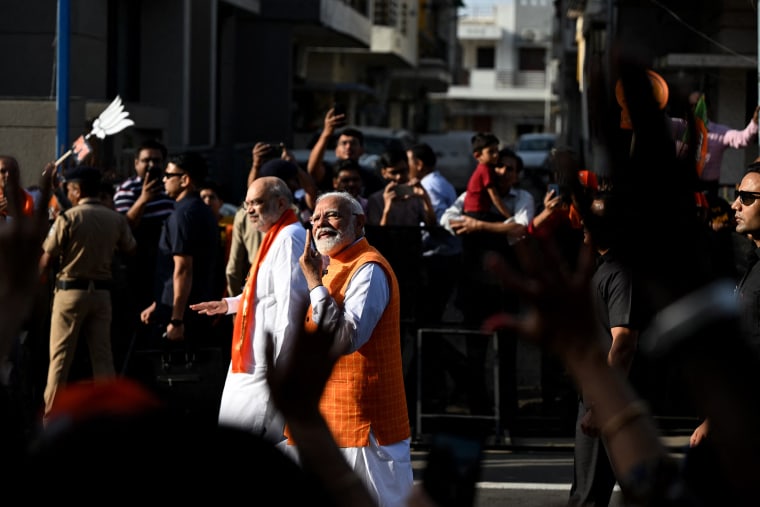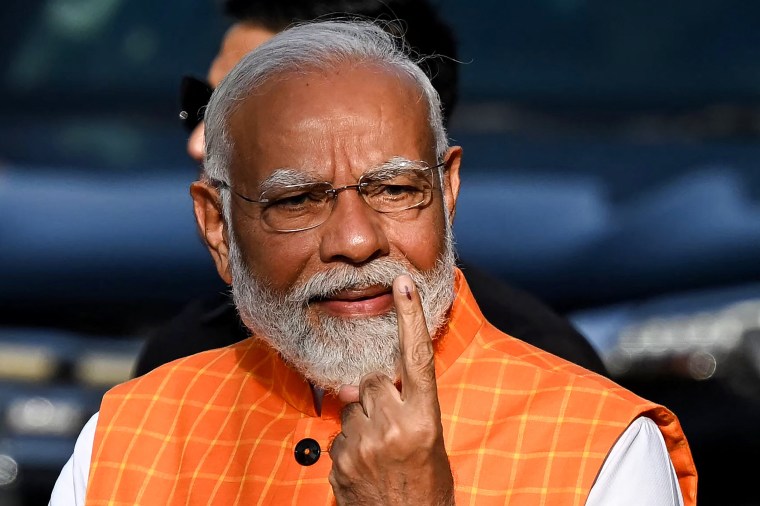Prime Minister Narendra Modi voted early on Tuesday as India held the third phase of a massive general election, when seats in his home state of Gujarat and 10 other regions will be decided.
The world’s most populous nation began voting on April 19 in a seven-phase election in which nearly one billion people are eligible to vote, with ballots set to be counted on June 4.
Voter turnout, however, has been a concern as the first two phases registered marginally lower numbers compared with 2019 polls and initial figures from the Election Commission showed a fall on Tuesday as well at 61.45%, compared with around 66% in the same phase five years ago.
Modi is seeking a rare third consecutive term in a vote that pits his Hindu nationalist Bharatiya Janata Party (BJP) against an alliance of more than two dozen opposition parties. Surveys suggest he will win a comfortable majority.
Modi cast his ballot in the Gandhinagar constituency where his number two, Home Minister Amit Shah, is the BJP candidate.
He urged citizens to actively participate in the “festival of democracy,” while taking care of their health as summer temperatures continued to rise in many parts of the country.
Clad in saffron and white, he was surrounded by hundreds of supporters and party members, signing autographs and talking to children on the way to the polling station.
Modi’s campaign began by showcasing his economic record, welfare measures, national pride and personal popularity.
The BJP relies heavily on his popularity, with his image adorning everything from sacks of rice handed out to the poor to large posters in cities and towns.
But some voters said it was not enough.

“Yes, the government gives us free rice, but what’s the point? Look at the cost of potatoes and onions. It was never so high before,” said 50-year-old Rina Kathar from Baligate in the northeastern state of Assam, which also voted on Tuesday.
Assam is prone to frequent flooding and M. Ahmed, 30, said his basic concerns included bad roads and poor drainage systems in the state capital, Guwahati.
Modi changed his campaign strategy after the first phase of voting and focused more on firing up BJP’s Hindu base by attacking rivals as pro-Muslim, even as a survey said jobs and inflation were the main concerns of voters.
In an interview with broadcaster Times Now that aired on Monday, Modi said he does not oppose Islam or Muslims and wants the community to think about their future growth as they vote.
Modi’s critics accuse him and his party of targeting minority Muslims for electoral gains, and the allegations grew after Modi referred to Muslims in a recent speech as “infiltrators” who have “more children.”
Tuesday’s polling covered 93 seats in 11 states and territories, with Gujarat and Maharashtra in the west and Karnataka in the south accounting for 50 seats. That would complete voting for 283 of Parliament’s 543 elected seats.
In the 2019 elections, the BJP won more than 70 of 93 seats up for grabs on Tuesday, but it faces tougher contests this time as the main opposition Congress party has gained strength in Karnataka and a regional partner has split in Maharashtra.
Voter turnout of 66.14% and 66.71% respectively in the first two phases has been marginally lower than corresponding phases in the 2019 election, with analysts blaming the summer heat and the lack of a single strong issue to motivate voters.
The Election Commission has since stepped up a campaign to encourage people to vote while consulting with weather officials and health and disaster management agencies to deal with the impact of the heat wave on Tuesday’s vote.
Among those who voted in Gujarat was Gautam Adani, the billionaire chairman of the Adani Group conglomerate.
“Today is the festival of democracy and I appeal to people to come out and vote,” he told reporters after voting. “India is moving forward and will continue to do so.”
